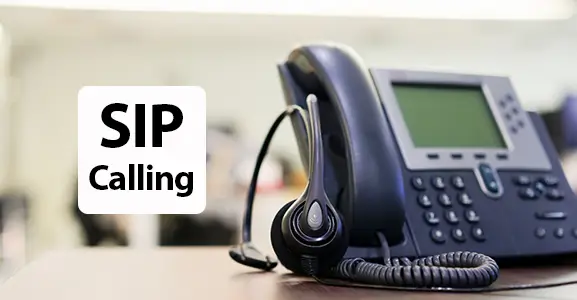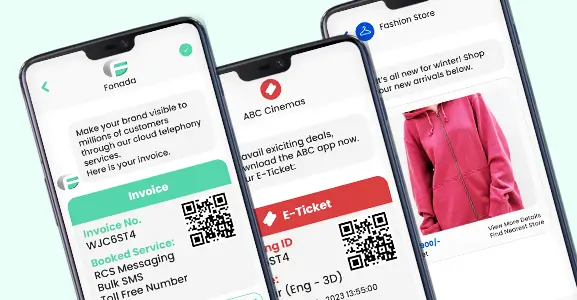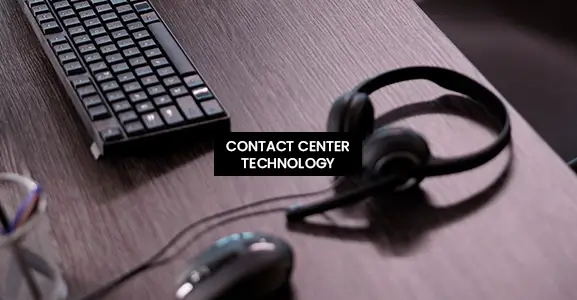Session Initiation Protocol, or SIP, is a signaling protocol used in Voice over IP (VoIP) and other real-time applications. It initiates, maintains, and terminates communication sessions between two or more devices. If you’re planning on using VoIP for your business or home phone service, it’s essential to understand the basics of SIP calls. This post will cover everything about how SIP calling works to its benefits.
What Is SIP Calling?
SIP calling means voice over IP (VoIP) technology that lets you make calls over the internet instead of a traditional phone. You can make SIP calls using an IP phone or a VoIP service provider to any phone number, whether a landline or a mobile phone.
There are many benefits to using SIP calling, including lower costs, increased flexibility, and enhanced features.
How Does A SIP Call Work?
Signaling protocol sets up and maintains a SIP call, which uses IP networks to connect the callers. After setting up the call, the media streams between the two parties using RTP, UDP, or TCP. The media streams carry the voice or video data.
To understand how a SIP call works, you must be familiar with the following concepts:
- You can set up SIP calls using a signaling protocol
- The media streams carry the voice or video data
- RTP is the most common media streaming protocol
- You can make SIP calls using either an IP phone or a computer
Also Read: Simplifying Customer Communication With Text-Based Reminder Message
Why Does The Business Need SIP Calling?
Save On Business Calling Costs
SIP Calling may help businesses save up to 70% on their monthly phone bill.
SIP Calling leverages the internet to save long-distance rates and lets you make calls from anywhere with an internet connection.
SIP Calling saves money by eliminating multiple phone lines. With SIP Calling, one line can handle multiple calls simultaneously, saving you money on your monthly phone bill and improving efficiency in your office.
If you are looking for ways to save money on your business calling costs, SIP Calling is a great option.
Low Learning Curve
The SIP protocol is simple and well-documented. Because developing SIP-based apps is easy, businesses of all sizes may deploy SIP-based solutions.
Scale Up Or Down As Needed
If you have a business that needs to make or receive many phone calls, then SIP calling might be a good option. SIP calling can be very scalable, so if your business needs to make more or fewer phone calls, you can easily adjust your call volume.
Experience High-Quality Voice Calls
SIP calling is the latest technology for making VoIP calls. It enables you to make high-quality calls without a lot of bandwidth. A perfect solution for companies that need to execute calls in bulk or to make calls with high-quality audio.
User-Friendly
SIP calling is user-friendly. The average person can use SIP without special training, and you can make and receive calls using SIP with just a few clicks.
SIP calling is also very efficient. It uses the internet to connect calls, so you don’t have to worry about expensive long-distance charges. Because it uses the internet, you can make calls from anywhere.
SIP calling is very flexible. You can use it for personal or business calls, and you can even use it to make international calls.
Efficient
SIP calls may be the right solution if you’re looking for a more efficient way to make calls. With SIP calling, you can make calls using your existing internet connection, saving you money on long-distance and international calls. And because you make SIP calls over the internet, they’re often clearer and more reliable than traditional phone calls.
High-Quality Sound
The audio quality of SIP calls is excellent, and you may even use it for conference calls. However, if you want to use SIP calls for business purposes, make sure that you have a high-speed Internet connection so that the quality of the call will remain high.
Offer Excellent Customer Service
SIP calling offers excellent customer service for businesses. The call quality is clear, and there are no dropped calls, so customers can always reach the company they need to. Additionally, SIP calling offers features like caller ID, call waiting, and voicemail that can help businesses keep track of their customer’s needs and ensure they can always provide the best possible service.
Who Uses SIP Calling?
Various businesses and organizations use SIP calling, including small businesses, large corporations, call centers, and government agencies. SIP calls can provide significant cost savings and improved call quality compared to traditional telephone systems.
How To Use SIP Calling?
You’ll need a few things to use SIP calling:
You must first have a SIP client. You may make and receive SIP calls online with this software application. Many SIP clients are available, so find one that works well for you and your operating system. Once you have a SIP client installed, you’ll need to configure it with your SIP account information, which usually includes the server address, username, and password.
Next, you’ll need a broadband internet connection with enough bandwidth to support VoIP calling, and a regular home DSL or cable modem should work fine. And finally, you’ll need a headset with a microphone to talk and listen during your calls.
Once you have all of that setup, making calls with SIP is pretty straightforward. Enter the client’s phone number or SIP address in your SIP client.
What Is SIP Basic Call Flow?
A SIP call flow is a process that enables two people to communicate with each other using the Session Initiation Protocol. You can use this protocol to set up and control media sessions over the internet, such as video and voice calls.
When you make a call using SIP, your voice converts into digital signals sent over the internet to the person you call. The called person’s phone then converts the digital signals to their voice so you can hear them.
The SIP call flow is similar to other Internet protocols, such as email. However, some key differences make SIP more efficient for real-time communication, such as voice and video calls.
There are three main steps in a typical SIP Call Flow:
- The caller sends an INVITE request to the called party’s SIP address. This request starts the call and contains information about the caller, such as their name and phone number.
- The called party’s SIP server receives the INVITE request and forwards it to the party’s phone.
- The called party’s phone rings, establishing the connection between the two parties when answered.
Once the connection is established , both parties can communicate in real-time. When the call ends, either party can hang up, and the connection gets terminated.
Also Read: Reasons Why You Should Invest In Landline Number For Business
What’s The Difference Between SIP And VoIP?
SIP meaning session initiation protocol is a signaling protocol for initiating, maintaining, and terminating real-time sessions that include voice, video, and messaging applications. SIP is a key technology in VoIP (Voice over IP) systems.
VoIP is a type of telephony that uses an IP network—usually the public internet—to route phone calls. VoIP can also refer to the actual telephone calls made using this system. When you make a VoIP call, your voice converts into digital data and sends over the internet to the person you’re calling. It converts back data into audio, so your call recipient can hear you.
How SIP Calling Helps Customer Service
SIP (Session Initiation Protocol) is a technology that enables customers to make calls using an Internet connection rather than a traditional phone line. It is helpful for customer service representatives who need to be available by phone.
Sip Calls Can Help Improve Customer Service In Several Ways:
- It can reduce wait times for customers who need to speak with a representative.
- It can enable representatives to handle more calls simultaneously, which can help reduce the overall call volume.
- SIP calls can help improve the quality of calls by providing clear audio and eliminating background noise.
Communication Types That SIP Calling Can Handle?
SIP calls can handle various types of communications, including voice, video, and text. Voice calls are the most common SIP call, but video calls are becoming more popular. You can also send text messages using SIP, although this is not as common.
SIP can handle voice or video communication, including VoIP calls, traditional phone calls, and even conference calls. SIP can also handle text messaging and instant messaging, making it a versatile tool for businesses of all sizes.
Tips For Optimizing Your Sip Calling Experience
Are you looking to improve your SIP calling experience? Here are a few tips to help you optimize your calls and get the most out of your service:
1. Check Your Network Connection
Before making or receiving a SIP call online, it’s important to check your network connection. A strong and stable connection is essential for clear and consistent call quality.
2. Use A Headset
A headset reduces background noise and improves call quality, and it’s crucial in a noisy environment.
3. Adjust Your Voice Settings
If your voice sounds muffled on SIP calls, try adjusting your application’s mic sensitivity or volume settings. It can help to improve clarity and ensure that your voice is coming through loud and clear.
4. Test Different Service Providers
If you’re not happy with your current SIP service provider, it may be worth considering switching to another one. Many different providers are available, so it’s worth researching to find one that offers the features and call quality you’re looking for.
Can SIP Calls Be Done On IPhone And Android?
Yes, you can! You can use an app like Google Hangouts or Skype to make SIP calls on your iPhone or Android device.
Conclusion
SIP calling is a great way to save money on your phone bill and offers many other benefits. With SIP calls, you can enjoy HD voice quality, caller ID, call waiting, voicemail, and more. You can also use SIP calls to make international calls at very low rates. SIP calling is an excellent option if you’re looking for an affordable and reliable way to make VoIP calls.
FAQs
SIP call means using the session initiation protocol to establish and manage communication sessions. SIP is a signaling protocol that controls multimedia communication sessions such as voice and video calls over an IP network.
You can make SIP calls using various devices, including computers, smartphones, and VoIP phones. To make a SIP call, both the caller and the recipient must have a SIP address (also known as a SIP URI).
You can make SIP calls over the internet without incurring long-distance charges. Additionally, You can easily route SIP calls through firewalls and NAT devices.
A SIP call is a relatively new technology; most people still use traditional phone lines. However, SIP calling may be right for you if you’re looking for a more efficient and cost-effective way to make calls.
SIP calling uses your existing internet connection to place and receives calls to be more reliable than a traditional phone line. It’s usually cheaper than a regular phone line since it uses your internet connection. You can also use SIP call features like Voicemail, Call Forwarding, and Call Waiting without incurring additional charges.
If you’re interested in trying a SIP call, do some research to find a reputable provider. Once you’ve found a provider you’re comfortable with, sign up for a sip calling account and give it a test run.
No, SIP calling and WiFi calling are not the same. Although both use the internet to make calls, they work differently.
SIP calling uses a VoIP service to connect calls. You can make your calls over the internet using an IP address instead of a phone number.
You may place calls using WiFi instead of a cellular network using WiFi calling. It is helpful if your mobile connection is weak or you want to save data.
Both SIP calling and WiFi calling have their advantages and disadvantages. SIP calling is typically cheaper than traditional phone service, but it can require more setup and may not work with all phone numbers. WiFi calling can be more convenient than using your cell signal, but it may not be available in all areas.
SIP is a signaling protocol that modifies, creates, and terminates sessions with one or more participants. These sessions can include voice, video, or data communication. You can use SIP to call a traditional phone number.
A SIP number looks like a traditional phone number but has a few key differences. SIP numbers typically have the letters “SIP” or “VoIP” in the front, followed by a string of numbers. For example, a SIP number might look like “SIP: 555-123-4567” or “VoIP: 555-123-4567.”
You may use your SIP number anywhere globally as long as you have an internet connection since SIP numbers do not tie to any one place.

Dec 11, 2024
Top Contact Center Optimization Tools For 2024
“A thriving business knows how to fetch maximum output from limited resources by optimizing ca... Read More
Nov 13, 2024
What Is Brand Communication? CPaaS Role Explained
Did you ever wonder why some advertisements grab your attention instantly, while others do not? The... Read More
Nov 01, 2024
What Is Automated Messaging And How Does It Work?
Automated messaging or text automation empowers businesses and marketing professionals to connect wi... Read MoreLatest Updates
From Fonada
Industry Insights, Trends, Innovations, Updates, and Case Studies from Industry Experts
View
Customer
Reviews
Discover why our customers love us - read their authentic and heartfelt reviews!
View
Case
Studies
Explore real-life scenarios, offering analysis, and solutions to practical challenges
View
Convert Leads Into Sales With Fonada
Trusted CPaaS Solution Provider








